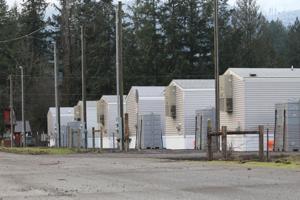Oregon lawmakers hear from wildfire survivors still waiting on relief

(The Center Square) — Oregon lawmakers on Thursday heard from survivors of the state’s 2020 wildfires who laid out the work needed to rebuild their homes.
Over four and a half hours, the 10 members of the House Special Committee on Wildfire Recovery listened to more than 30 testifiers from Talent to Almeda.
In the months since the fires tore through some 1,600 square miles of the state last Labor Day, hundreds of families have been living in motel rooms, RVs, or bunking with relatives. Most have relied on local charities in lieu of public aid.
Patience is wearing thin for survivors still waiting on federal aid applications and homeowner insurance payouts who say they are at the end of their rope.
“I still don’t sleep well and only work part time,” Eden McCarthy of Ashland said. “Compared to some, I feel I landed well, but my nervous system is still revved despite all my efforts to feel things and get calm.”
Towns like Talent and Phoenix were all but destroyed while decimated towns like Detroit are millions short of the cash needed to rebuild.
According to an Oregon Public Broadcasting report, about 57% of federal wildfire aid applications were denied.
The national denial rate for the federal Individuals and Households Program is 69% for fire disasters due to high volumes of fraudulent claims, officials from the Federal Emergency Management Agency said in a statement.
Among the issues raised by wildfire survivors who testified to the committee was the lack of warning when the flames began lapping their hometowns.
“I went out and saw the cloud, but I was in denial that the fire would destroy our homes,” said Allen Hallmark, a former resident of Talent. “I didn’t hear any warnings on my phone or on TV. There were no sirens sounded.”
Carly Pedersen, a 12-year resident of Talent, described to the committee how she was left with no choice but to follow a police car for hours through downtown Phoenix and Medford with no idea of where to go.
In the absence of advance notice, Pedersen said, evacuees like herself had no choice but to flee in a panic to nearby towns like Ashland as the fires quickly began cutting off major highways.
“There were people who were evacuated, who had no choice where they got to evacuate to,” Pedersen said. “So but people who didn’t evacuate when I did, who evacuated a little bit too late to go that direction, because I barely made it out.”
Pedersen recommended the state roll out a sound alert system like those used in the Midwest for tornadoes, an idea which piqued the interest of Rep. Brian Clem, D-Salem, the committee’s chair.
“One of my colleagues, who was an old radio guy, mentioned that a lot of the newer venues like Sirius and iTunes, they’re not required or obligated to do the emergency broadcast system,” Clem said. “We have to think about that because so many people don’t watch the news that we all grew up. You don’t get that on Netflix.”
Reworking Oregon’s emergency management system is on the agenda this session in light of unflattering findings by state auditors which found it was understaffed and underprepared.
Others testifiers like Helaine Alon of Almeda worry about what the wildfires may mean for the environment.
“There’s a lot to learn,” Alon said. “And I don’t want us to be guinea pigs, to be a cancer cluster in 10, 15 years.”
Canada’s Fort McMurray water reservoir and many like it are still reeling from a 1.5 million acre wildfire in 2016 which tainted the water supply with ash and metal four years later, according to a 2020 study published in ScienceDirect.
Jamie Dunn, who lived in an Ashland mobile home park, shared others’ concerns that the wildfires will exacerbate Oregon’s tight housing market.
“My guess is that when all the manufactured home parks are rebuilt in southern Oregon, the owners will jack up the space rents and make it more difficult to afford living in this region,” Dunn said. “There are just not enough good paying jobs to keep up with this madness.”
The Department of Numbers reports Oregon’s statewide rental vacancy rate was just 4% in 2019. In fire-ravaged towns like Almeda, the rate is near zero.
Two testifiers, former Phoenix residents Kevin and Carol Vergin, said preventing future wildfires is a matter of rethinking state fiscal priorities.
“We should acknowledge that throughout most of the last thirty years in the US and Oregon, there has been a constant effort to reduce taxes,” the couple wrote in a written testimony. “These cuts have resulted in lean government staffing and agencies that are capable of doing their normal jobs but are clearly unable to respond to crises, such as the COVID-19 situation and these unprecedented wildfires.”
Over the past five years, the state Department of Forestry has seen its biennial budget fall by about $18 million or about 2%.
In the last 30 years, timber industry tax cuts cost Oregon counties an estimated $3 billion, an investigative report by ProPublica, the Oregonian, and Oregon Public Broadcasting found. Those cuts are now on the chopping block this session.
The House Special Committee on Wildfire Recovery will reconvene on Monday, February 22. People can sign up to testify on the committee’s webpage.
Disclaimer: This content is distributed by The Center Square
